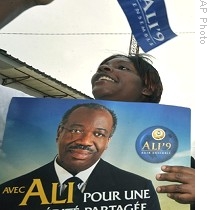Dakar
28 August 2009
Voters in Gabon go to the polls Sunday to choose a new president to succeed long-time leader Omar Bongo. Mr. Bongo died in June after 42 years in power.
 |
| Supporter of Ali Ben Bongo holds poster of their leader during electoral meeting in Libreville, 27 Aug 2009 |
Bongo has urged voters to ignore rival candidates who he says are traitors and liars who will turn their backs on the country. But he has also taken a more populist approach - promising to nearly double the minimum wage and build 5,000 new homes a year.
Joel Mamboundou works in Gabon for the civil society network, The Access Initiative. He told VOA's French to Africa Service that he does not believe conditions exist for a fair vote because Gabon's ruling party is managing both the electoral process and the media.
Mamboundou says civil society groups believe government opponents should unite behind a single opposition candidate because that would maximize the chance of realizing a change of power.
Some candidates are throwing their support behind former interior minister Andre Mba Obame. But Obame is unlikely to emerge as the leading opposition contender because long-time challenger Pierre Mamboundou remains in the race.
The Union of the Gabonese People candidate lost to Omar Bongo in 1998 and 2005. He is campaigning on a platform of universal health coverage and says Gabon can not accept power passing dynastically from father to son.
Jean Mamboundou says opposition parties have failed to heed civil society's call for a single candidate because many believe they can win the election outright on their own.
Mamboundou says the ego of some of the candidates means they are unwilling to campaign for someone else. There is also the issue of coalition rule. Even if a party wins a small percent of the vote, it may be enough to make them a player in a power sharing deal.
If the electoral process is transparent, Mamboundou says, there will be no problem because whether opposition parties are united or not, at the end of the day they all want there to be a change of power.
Transparency remains a big question in Gabon. The electoral commission has registered an improbable more-than-800,000 people for this vote. Gabon has fewer than 500,000 people, 40 percent of whom are below the age of 15.
Gabon is Africa's sixth-largest exporter of oil and the world's fourth-biggest producer of manganese. But despite a per capita gross domestic product of $14,000, the United Nations estimates that 70 percent of people live below the poverty line.
Before his death in a Barcelona clinic two months ago, Omar Bongo's French bank accounts were frozen as part of an investigation into African leaders embezzling public funds. The anti-corruption group Transparency International says more than 30 Bongo family properties in France worth nearly $200 million could not have been purchased on his state salary alone.
The Bongo family denies any wrongdoing.